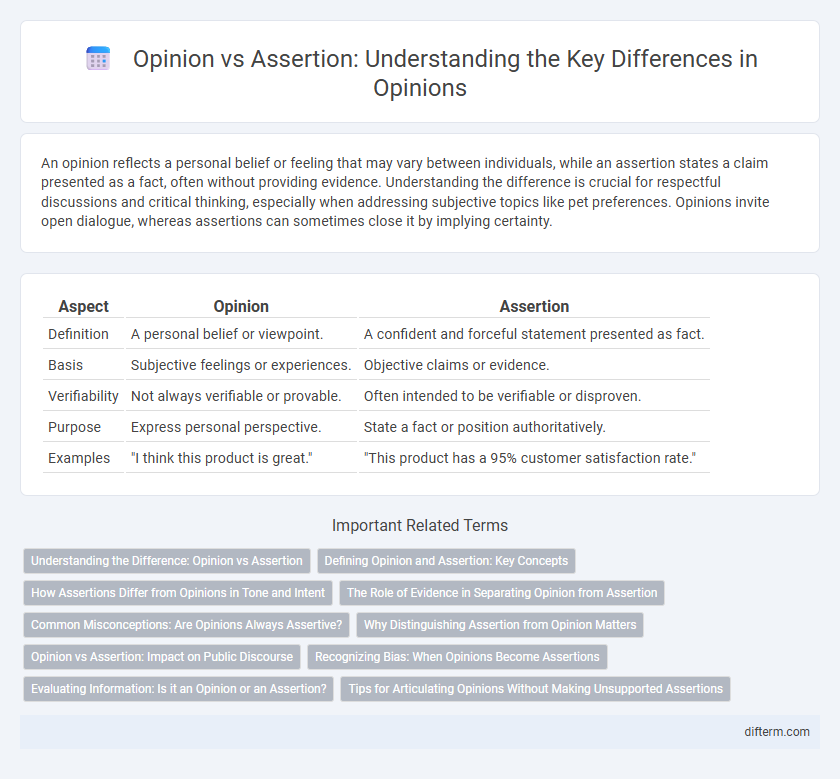An opinion reflects a personal belief or feeling that may vary between individuals, while an assertion states a claim presented as a fact, often without providing evidence. Understanding the difference is crucial for respectful discussions and critical thinking, especially when addressing subjective topics like pet preferences. Opinions invite open dialogue, whereas assertions can sometimes close it by implying certainty.
Table of Comparison
| Aspect | Opinion | Assertion |
|---|---|---|
| Definition | A personal belief or viewpoint. | A confident and forceful statement presented as fact. |
| Basis | Subjective feelings or experiences. | Objective claims or evidence. |
| Verifiability | Not always verifiable or provable. | Often intended to be verifiable or disproven. |
| Purpose | Express personal perspective. | State a fact or position authoritatively. |
| Examples | "I think this product is great." | "This product has a 95% customer satisfaction rate." |
Understanding the Difference: Opinion vs Assertion
An opinion reflects a personal belief or preference that is subjective and open to interpretation, whereas an assertion is a definitive statement presented as fact, often requiring evidence to be validated. Grasping this distinction is crucial for effective communication, allowing individuals to differentiate between personal viewpoints and statements intended to convey objective truth. Recognizing when a claim is opinion-based or assertive enhances critical thinking and promotes clearer, more respectful discourse.
Defining Opinion and Assertion: Key Concepts
Opinion represents a personal belief or judgment that is subjective and open to interpretation, while assertion is a confident and forceful statement presented as fact. Opinions often rely on individual perspectives, emotions, or experiences, whereas assertions demand evidence and logical reasoning to support their validity. Understanding the distinction between opinion and assertion is crucial for effective communication and critical thinking in discourse.
How Assertions Differ from Opinions in Tone and Intent
Assertions carry a definitive tone reflecting certainty and intent to establish facts, whereas opinions express personal beliefs or interpretations with subjective nuance. The intent behind assertions is to convince or inform based on evidence or confidence, while opinions invite reflection and acknowledge individual perspectives. Understanding these distinctions aids in effective communication and critical evaluation of statements.
The Role of Evidence in Separating Opinion from Assertion
Evidence plays a crucial role in distinguishing opinion from assertion by providing verifiable support that transforms subjective viewpoints into credible claims. Assertions lack substantiation and rely solely on personal conviction, while opinions fortified with data or facts gain legitimacy and influence. This clear boundary highlights the importance of evidence-based reasoning in informed discourse and critical thinking.
Common Misconceptions: Are Opinions Always Assertive?
Opinions are often mistaken for assertive statements, but they primarily reflect personal beliefs or feelings rather than incontrovertible facts. Unlike assertions, which claim objective truth, opinions are inherently subjective and open to interpretation or debate. This common misconception blurs the distinction between expressing a viewpoint and making a definitive claim.
Why Distinguishing Assertion from Opinion Matters
Distinguishing assertion from opinion is crucial for clear communication and critical thinking because assertions claim objective truth supported by evidence, while opinions reflect personal beliefs or feelings without requiring proof. Recognizing this difference helps prevent misinformation and encourages respectful debate by allowing individuals to challenge unsupported opinions and scrutinize factual claims effectively. This clarity fosters informed decision-making and enhances intellectual honesty in discussions.
Opinion vs Assertion: Impact on Public Discourse
Opinion shapes public discourse by reflecting personal beliefs and values, fostering dialogue and diverse perspectives; assertion, presented as fact, demands evidence and can polarize audiences when unsupported. Differentiating opinion from assertion enhances critical thinking and media literacy, enabling individuals to evaluate information more effectively. Clear distinction between these elements promotes healthier debates and reduces misinformation in society.
Recognizing Bias: When Opinions Become Assertions
Opinions often reflect personal perspectives influenced by individual experiences, while assertions present statements as objective truths without room for doubt. Recognizing bias is crucial when opinions are framed as assertions, as this can obscure the line between subjective belief and factual evidence. Critical evaluation helps distinguish genuine facts from opinions disguised as absolutes, fostering clearer communication and understanding.
Evaluating Information: Is it an Opinion or an Assertion?
Evaluating information requires distinguishing between opinions, which express personal beliefs or interpretations, and assertions, which present statements as factual claims often supported by evidence. An opinion reflects subjective viewpoints influenced by individual experiences, while an assertion demands verification through objective data or logical reasoning. Effective critical thinking hinges on identifying whether a statement is an opinion or a verifiable assertion to assess its credibility and influence decision-making.
Tips for Articulating Opinions Without Making Unsupported Assertions
Articulating opinions effectively requires grounding them in clear reasoning and evidence to avoid unsupported assertions. Using phrases like "I believe" or "In my view" signals subjectivity while presenting relevant facts strengthens credibility. Ensuring opinions are framed as perspectives rather than absolute truths helps maintain respectful and constructive dialogue.
opinion vs assertion Infographic

 difterm.com
difterm.com